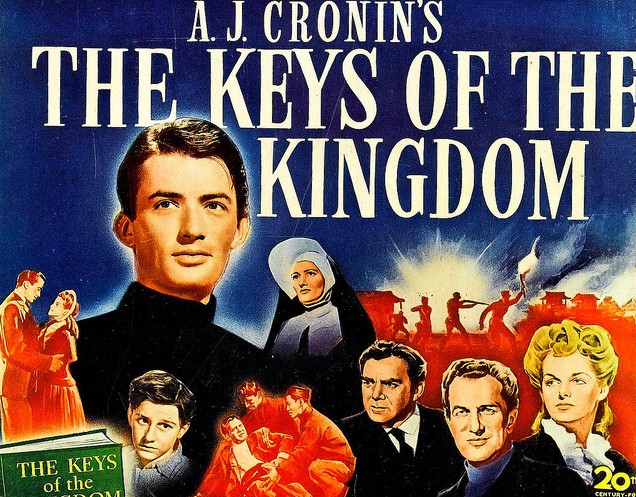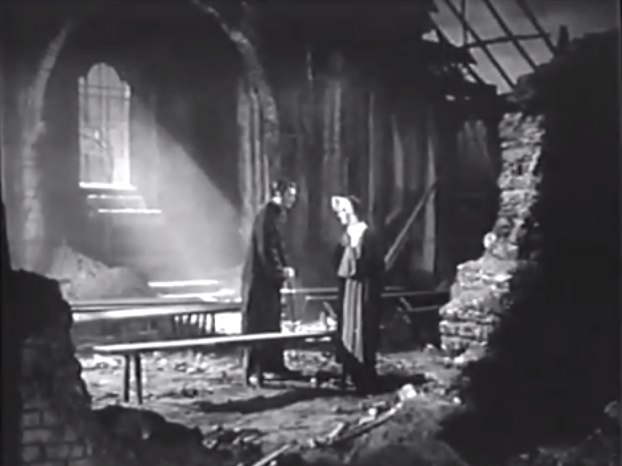
Pious. In today’s vernacular, the term has come to describe those with a platitudinous zeal for religion, usually with more than a twinge of a negative connotation. The word “pious” itself however stems from the Latin “pius”, which can be roughly translated as devoted. In classical literature, it meant a devotion to three things in particular: family, friendship and finally, to faith. This original idea of duty, encompassing many facets of character, is perhaps a more accurate description of Father Francis Chisholm, a (very regrettably) forgotten figure of cinema.
The film begins in 1938, with the Father now returning to his hometown in Scotland after a lifetime of missionary work. His rather unorthodox methods raise eyebrows in the church, even prompting the Bishop to coerce him into retirement. The Monsignor is sent to inform Chisholm about this, and quite by accident, discovers the elderly priest’s journals. In it, he reads of a simple, and yet very remarkable, story; the life of Father Chisholm. Although fairly standard, this framing device is effective; we alternate between a rather reserved third person narrative and a more intimate first person perspective to get a rounded portrait of various events and characters.
Covering a period of more than 60 years, The Keys of the Kingdom is, essentially, a character study. I realise that I have mentioned the aspect of character (s) several times already within this review, but I don’t think this point can be stressed too strongly. It is in the depiction of Father Francis Chisholm, his persona, as well as the relationships and the actions this particular persona results in, that the film succeeds superbly.
The early life of the Father is marred by tragedy. As a Catholic boy in Protestant Scotland, he experiences heartbreak when his parents are inadvertently killed. Some years later, Francis is further devastated by the death of his childhood sweetheart. It is these circumstances though that not only shape his views and opinions, but eventually prompt him to join the church. After a number of unsuccessful dabbles in various churches around the country, the young Father Francis is encouraged by his mentor and friend, Bishop Hamish MacNabb, to establish a parish among the native Chinese. And it is in this foreign land, a place where Chisholm is greeted with much resentment and hardship, that his patience and good nature is truly tried.
Among Francis’ obstacles is in fact one of his own: the haughty Reverend Mother Maria-Veronica. Rose Stradner disappears completely into the role of the cool and is hostile nun, and for the most part of the film, is thoroughly insufferable. I say “for the most part” because there is this one scene, about 20 minutes to the end, in which she redeems herself almost entirely. I actually think I have never changed my mind about someone, fictional or otherwise, quite as eyebrow-raisingly quickly as I did about the Reverend Mother. To understand why I did so requires a more rigorous examination of this wonderful scene.

The episode takes place in the Father’s parish, some time after the horrendous bombings of the little Chinese town in which our characters reside. Chisholm’s church has been destroyed, and the two stand together among the ruins of what was once their modest, but very much beloved, place of worship. The Reverend Mother confesses her past resentment of Father Chisholm —she talks of her envy of his “true and honest compassion” while hers was “difficult, filled with doubt and pain”. It is in this scene that the poignant friendship of a lifetime, the special attachment between the Father and the Reverend Mother, finally begins.
Furthermore, this turning point of the movie is also memorable from a purely aesthetic point of view. Throughout the scene, Miller employs black and white cinematography with the utmost consideration and thought. Shades of grey contrast and converge, playing off each other dramatically. The closing image, in which the light of goodness in sincerity floods into the shadows, is an especially beautiful composition.
What sets this movie apart from the rest is, no doubt, its constant sensitivity. It shines through every frame of the entire film; from the portrayal of the Chinese villagers, to the soft camera styles, to the personal and spiritual relationships that run through the central tale. And at its core is the young Gregory Peck in one of his most captivating performances. As Chisholm, he is selfless and good-humoured, with a quiet dignity that the actor himself has ultimately come to epitomise.
I am glad you enjoyed the film Rachel :) . IMO it was Gregory Peck’s best film. But the ensemble in this picture did a great job as well. Vincent Price and Thomas Mitchell are terrific character actors. If you ever get a chance watch Thomas Mitchell in The Fighting Sullivans, it is based on a true story and I think it was Mr. Mitchell’s signature film.
There are so many great moments in this film that stand out to me. I thought it was very cool when Father Chisholm took out that cannon. There are also touching moments, like near the end when Father Chisholm gave his blessing to the whole village. Also in the final moments when he tells the boy “get the rods” and he goes fishing happily contented even after all those years. One character trait that Father Chisholm had that I really admired was his peace of mind. I think that is what all human beings in life cherish the most. He was so easygoing and didn’t seem to worry about anything. No matter how dire the circumstances, he just trusted in God. His faith pulled him through!
Like you said the transformation by the Sister/Nun at the end was the most effective moment of the film. You aren’t human if you didn’t shed a tear during that part of the movie.
I don’t know if you ever saw Ingrid
Bergman in The Inn Of The Sixth Happiness or Jennifer Jones in The Song Of Bernadette but I always thought these two films would make great companions to The Keys Of The Kingdom, three great films that just touch and stir one’s soul. I would imagine you have seen Bing Crosby in Going My Way and The Bells Of St. Mary’s, another two films that are essential movies in this kind of genre. Nice review Rachel, you hit on the key point of the film and conveyed it very well. I look forward to more of your reviews and personal takes on films.
I also agree completely about those final moments of the film. The scenes in which Chisholm and the sister reminisce about their life together, and the blessing of the village are among the most poignant moments of the film (or, indeed, any films for that matter!)
As you said as well, the scene in which he asks Nora’s grandson to fetch the fishing rods is very special. For me, it symbolised the continuity of both Chisholm’s unbreakable affection for Nora, and, of course, his friendship with Bishop Hamish. The little fact that Chisholm carried the old Bishop’s umbrella with him wherever he went, even decades after their last meeting, was also touching.
I have seen two of the movies that you have mentioned (The Inn of the Sixth Happiness and Going My Way, both of which were very lovely) and look forward to seeing the others.
Thank you for reading!
Oh…… I forgot to mention Sir Cedrick Hardwicke who does a fine job in here as well. There is a cool film he does with Lionel Barrymore called On Borrowed Time. It deals with death in both a serious and funny way. I think you would really enjoy it. I have thousands of films from the 30s, 40s and 50s, feel free to email me if you ever need a movie Rachel, I would be glad to send it to you….
Oh and your so right about that scene with Farther Francis and the nun. I think she really gave a sincere apology to him. She certainly did a real self examination of herself and owned up to how dreadful she had treated him all those years. Sometimes as human beings we find it hard to look in the mirror and sincerely find fault with ourselves. Not only did she do that but she also gave a sincere contrition in the process. Great scene in the film! Great movie!
That’s very kind of you —I’ll definitely remember that :)
Very true about the Reverend Mother, it must’ve been so difficult for her to apologize. At the same time though, speaking so frankly about her past must’ve been a great weight finally off her shoulders.
Thank you again for another thoughtful recommendation! There certainly are many fantastic films out there that I still need to see.
I just remembered Spencer Tracy in The Devil At 4’Oclock, another movie you might enjoy that kind of relates to the Keys Of The Kingdom in a little sort of a way. Tracy and Sinatra, a great pairing.